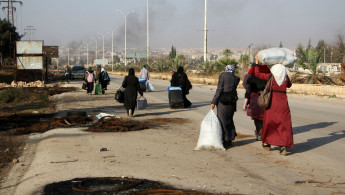Living conditions for East Aleppo's residents getting worse
A new UN report on life in East Aleppo has revealed deteriorating living conditions in the besieged Syrian city, causing widespread social and psychological problems.
According to UNHCR's "East Aleppo Protection Monitoring" report, there has been an increase in the need for psychotherapy, possibly linked to a rise in reports of violence.
"55% of 325 respondents expressed the need for psychosocial support, compared to 20% in late August," the report says.
Contrary to other reports from the city, there were a large number of citizens who reported that they didn't want to leave the city however, despite the ongoing siege.
"If there were safe and secure routes for civilians to leave East Aleppo city, 44% of respondents said that people would not leave, while 40% said that they would," the report says.
Of those that did want to leave, 41 percent said that they would go to rebel-held territory, 31 percent said that they would go to Idlib, and another 31 percent said that they would go to the countryside surrounding Aleppo.
The findings from 398 interviews of Aleppo residents shows that there are many problems and threats beyond aerial bombings and sniper-fire that affect the local citizens.
Researchers found that child labour in the city is a growing issue, with growing reports of children working during school time and child recruitment.
The majority of interviewees also reported witnessing children begging in their local neighbourhood in the last three weeks.
A recent report by The New Arab shed light on school conditions in Aleppo, where most schools continue underground and class sizes have shrunk in order to reduce the risk of being targetted.
Incidences of domestic violence, sexual violence and child marriage were also reportedly increasing with a number of reports of sexual favours made in exchange for aid affecting women and boys.
There has been an active siege on Aleppo since fighting broke out in 2012, however conditions have severely deteriorated over the summer as Russian and regime air-strikes have hit the local population hard.
Food and medicine levels are running out in the city and regime forces mounted a fresh offensive this week to defeat various rebel positions in the city.





 Follow the Middle East's top stories in English at The New Arab on Google News
Follow the Middle East's top stories in English at The New Arab on Google News
![The UAE is widely suspected of arming the RSF militia [Getty]](/sites/default/files/styles/image_330x185/public/2024-11/GettyImages-472529908.jpg?h=69f2b9d0&itok=Yauw3YTG)
![Netanyahu furiously denounced the ICC [Getty]](/sites/default/files/styles/image_330x185/public/2024-11/GettyImages-2169352575.jpg?h=199d8c1f&itok=-vRiruf5)
![Both Hamas and the Palestinian Authority welcomed the ICC arrest warrants [Getty]](/sites/default/files/styles/image_330x185/public/2024-11/GettyImages-2178351173.jpg?h=199d8c1f&itok=TV858iVg)